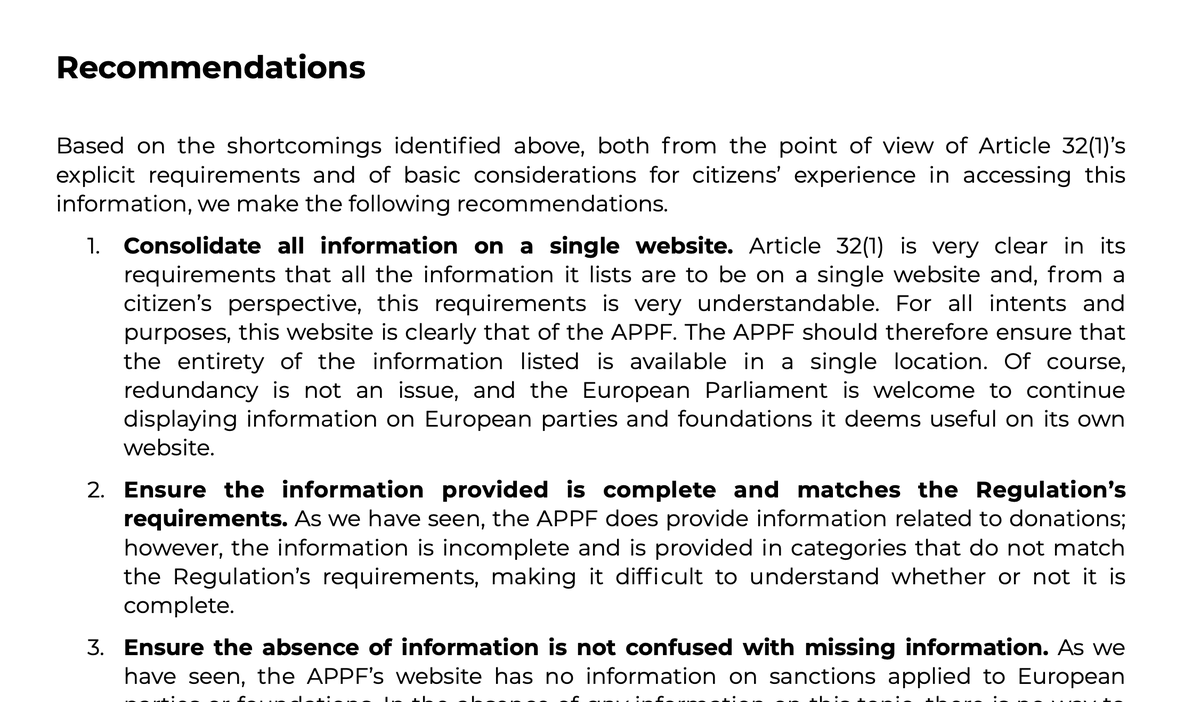Today, European Democracy Consulting lodged an official complaint with the @EUombudsman against the Authority for #EuropeanParties over its implementation of transparency requirements.
Why is this important? A short thread 👇 1/14
eudemocracy.eu/edc-takes-auth…
Why is this important? A short thread 👇 1/14
eudemocracy.eu/edc-takes-auth…
The APPF was set up in 2014 to register, control and sanction European parties & foundations. It is the #EU’s party monitoring body and watchdog. As such, it has a key role for anything relating to #EuropeanParties. 2/14
appf.europa.eu/appf/en/author…
appf.europa.eu/appf/en/author…
Regulation 1141/2014 establishes clear transparency requirements binding upon the APPF, the @Europarl_EN and European parties, aimed at ensuring that citizens and the #media have the means to know, engage with, and monitor #EuropeanParties. 3/14
eur-lex.europa.eu/legal-content/…
eur-lex.europa.eu/legal-content/…

In particular, it requires information about #EuropeanParties to be provided on a single website, including about sums received, financial statements, work programmes, name of donors and the value of their donations under certain conditions, sanctions & lists of member MEPs. 4/14 

However, the APPF had consistently failed to meet both the letter and the spirit of these requirements, with information located on separate websites, not up-to-date, not in line with the Regulation’s requirements, or is missing entirely. 5/14
The information is often published as provided by #EuropeanParties, in separate scanned PDFs. The APPF does not consolidate information and no data is provided in machine-readable formats. This falls far short of any standard of visibility, clarity and user-friendliness. 6/14 

This continued lack of public information, its incompleteness, the way it is displayed & the multiplicity of locations where it is stored are particularly damaging for citizens’ good understanding of #EuropeanParties that seek to represent them & that they vote for. #EP2019 7/14
This is especially important at the #European level, where citizens only have a limited familiarity with #EuropeanParties. The lack of a minimum visibility for EU parties guaranteed by the APPF has a direct impact on citizens’ choice-making ahead of EP elections. #EP2019 8/14 

Why are we doing this? Because we consider political parties an essential component of representative democracy. The EU & citizens stand to gain from stronger, more affirmed & more visible #EuropeanParties with a closer link to the citizens they represent. #Europeademocracy 9/14 

On 26 March, we notified the APPF of our intend to lodge a complaint within 3 months & provided an analysis of shortcomings & a report on #EP2019. To this day, the APPF has failed to take any remedial action to abide by its transparency requirements. 10/14
eudemocracy.eu/failure-appf-t…
eudemocracy.eu/failure-appf-t…
We call on the APPF to consolidate all information on #EuropeanParties on a single website, ensure the information provided is clear, complete, understandable, up-to-date & consistently updated, matches the Regulation's requirements, & available in machine-readable formats. 11/14 

We encourage them to go beyond basic requirements, as more information about #EuropeanParties is needed for the benefit of citizens. The @Europarl_EN's website can be a source of inspiration, as it lists electoral data in an interactive and clearly understandable manner. 12/14 

Finally, we hope @EUombudsman Emily O'Reilly will ensure essential #transparency criteria on #EuropeanParties for the benefit of a watchful #media, social scientists, and European citizens. This is the basis of our #Europeandemocracy. @EUOmbudsmanEOR 13/14
ombudsman.europa.eu/en/emily-oreil…
ombudsman.europa.eu/en/emily-oreil…

To all #EuropeanParties... you're welcome! 😉 @EPP @PES_PSE @ALDEParty @PDE_EDP @europeangreens @EFAparty @ECRparty @ECPM_official @IDParty_ @europeanleft @Pirates @VoltEuropa 14/14 

FYI @federalists @JEF_Europe @UEF_France @SpinelliGroup @EMInternational @MouvEuropeen_Fr @takeover_europe @StandUp4EU @EuDemLab @TheGoodLobby @EuroAlter @POLITICOEurope @EURACTIV
• • •
Missing some Tweet in this thread? You can try to
force a refresh










